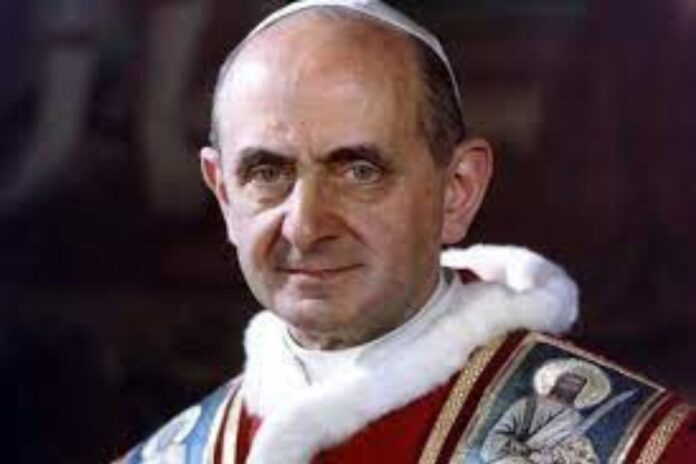Pope Paul VI, born Giovanni Battista Enrico Antonio Maria Montini (26 September 1897 – 6 August 1978), served as the head of the Catholic Church and sovereign of Vatican City from 1963 until his death in 1978. He succeeded Pope John XXIII and is best known for continuing and completing the Second Vatican Council, which aimed to modernize many aspects of the Church, including its relationship with other Christian denominations, the liturgy, and its approach to the modern world. He closed the Council in 1965, implementing many of its reforms during his papacy.
Introduction
Pope Paul VI, born Giovanni Battista Montini, is often remembered as one of the most influential figures in modern Catholic history. His leadership during one of the most transformative periods for the Catholic Church has earned him admiration and respect. From navigating the complexities of the Second Vatican Council to overseeing global political shifts, his legacy continues to resonate today. In this article, we’ll explore his life, his impact on the Church, and the challenges he faced during his papacy.
Who Was Pope Paul VI?
Early Life and Rise to Papacy
Pope Paul VI was born on September 26, 1897, in Concesio, Italy. He was the son of a prominent Catholic family, and from a young age, he demonstrated a deep commitment to the Church. He entered the seminary in his teens and was eventually ordained a priest in 1920. Over the next several decades, he rose through the ranks of the Vatican, working as a diplomat and later becoming a cardinal.
In 1963, following the death of Pope John XXIII, Cardinal Montini was elected as the 262nd pope of the Roman Catholic Church. Taking the name Pope Paul VI, he was determined to continue his predecessor’s work while also facing the growing challenges of the modern world.
Pope Paul VI and Vatican II
One of the defining aspects of his papacy was his role in the Second Vatican Council (1962-1965). This ecumenical council, convened by Pope John XXIII, sought to address the relationship between the Catholic Church and the modern world. He was tasked with bringing the council to its conclusion, which was no small feat.
The Council’s Key Achievements
Under Pope Paul VI’s leadership, the Second Vatican Council produced several key documents that redefined the Church’s approach to worship, interfaith relations, and the role of the laity. Some of the most significant outcomes included:
- The Constitution on the Sacred Liturgy: Reforming liturgical practices, including allowing the use of local languages in the Mass rather than Latin.
- The Declaration on Religious Freedom: Affirming the right to religious freedom and rejecting coercion in matters of faith.
- The Decree on Ecumenism: Promoting dialogue and cooperation between the Catholic Church and other Christian denominations.
Though the council brought about a wave of reform, it also sparked considerable controversy and division within the Church. He faced resistance from conservative factions who were wary of these changes.
Pope Paul VI and Social Issues
The Humanae Vitae Encyclical
In 1968, Pope Paul VI issued the Humanae Vitae encyclical, which addressed the issue of birth control. The document reaffirmed the Church’s traditional teaching against artificial contraception, a stance that was controversial, especially as the sexual revolution was taking place in many parts of the world.
The encyclical led to widespread debate within the Church and beyond. While some hailed it as a firm stand on moral teachings, others criticized it for not adapting to the realities of modern society. Despite the criticism, Pope Paul VI remained steadfast in his position, and Humanae Vitae remains a significant document in Catholic teaching to this day.
Pope Paul VI and Global Politics
Pope Paul VI was deeply engaged in global politics, particularly during the Cold War era. He worked to maintain peace between the United States and the Soviet Union, urging dialogue and diplomacy to avoid nuclear conflict. His efforts toward social justice were also evident in his support for developing countries and his calls for economic reform.
One of his notable actions was his trip to the United States in 1965, where he addressed the United Nations and called for global cooperation in solving social issues. He also visited several countries in Africa, Asia, and Latin America, emphasizing the Church’s commitment to peace, justice, and solidarity with the poor.
Pope Paul VI’s Lasting Legacy
Pope Paul VI’s papacy was marked by significant change, both within the Catholic Church and in the world at large. His commitment to peace, social justice, and interfaith dialogue set the tone for the Church’s approach to the modern world in the years that followed.
Canonization
Pope Paul VI was beatified by Pope Francis in 2014 and was later canonized as a saint in 2018. His canonization was seen as recognition of his enduring influence and his dedication to the faith. His papacy is remembered as a time of renewal, and his leadership helped shape the direction of the Church in the 20th century.
Frequently Asked Questions (FAQ)
What was Pope Paul VI known for?
Pope Paul VI is most famous for his role in guiding the Catholic Church through the Second Vatican Council and for his controversial stance on birth control through the Humanae Vitae encyclical. He was also known for his global diplomacy efforts and advocacy for peace and social justice.
How did Pope Paul VI contribute to the Second Vatican Council?
Pope Paul VI concluded the Second Vatican Council after taking over from Pope John XXIII. He implemented the council’s reforms, including changes to the liturgy and church teachings, and emphasized the importance of the Church engaging with the modern world.
Why was Humanae Vitae controversial?
The encyclical reaffirmed the Church’s ban on artificial contraception, which was seen as outdated by many in the context of the social changes happening during the 1960s, particularly the sexual revolution. It sparked debates within the Church that continue to this day.
Wrapping Up: Pope Paul VI’s Enduring Influence
Pope Paul VI’s legacy as a leader of the Catholic Church is undeniable. His leadership during the tumultuous years of the 1960s and 1970s helped shape the direction of the Church for future generations. Whether through his role in the Second Vatican Council, his stance on social issues, or his unwavering commitment to peace, Pope Paul VI’s contributions to Catholicism are still felt today. As a saint, he continues to inspire millions around the world to live out the values of faith, justice, and compassion.




